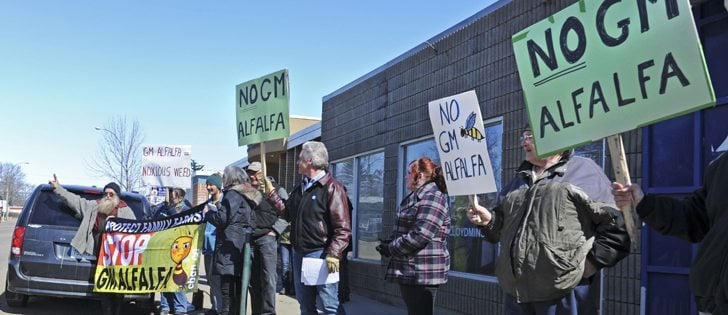NORTH BATTLEFORD, Sask. — Glenn Tait doesn’t think genetically modified alfalfa should be introduced to the marketplace, period.
“Genetically modified alfalfa is going to do a lot more harm than good,” said the National Farmers Union board member.
Tait and 20 other farmers and their supporters gathered during the noon hour April 9 outside federal agriculture minister Gerry Ritz’s constituency office in North Battleford. It was part of a cross-country event that saw the NFU and the Canadian Biotechnology Action Network rally against the possible introduction of GM alfalfa in Canada.
Events were also scheduled for 17 communities in Ontario and 21 other locations, including Ritz’s office.

Tait said the bottom line is the lingering negative economic impact that GM alfalfa would have on sensitive export and organic markets.
“People around the world don’t want GM products, and they’re not going to buy it. If we have it in our own exports, we can’t get rid of it, we can’t isolate it from anything else. If we haven’t got exports, that’s going to shut down those market opportunities for us,” he said.
“Right now we are exporting non-GM alfalfa in the organic market: feeding it to organic beef, organic milk, cheese and organic honey. That is all threatened by the introduction of GM alfalfa.”
He said there are more questions than answers about the new product.
Read Also

Canada and China discuss disputes over canola and EVs, says Ottawa
Senior Canadian and Chinese officials discussed bilateral trade disputes involving canola and electric vehicles on Friday, Ottawa said, but gave no indication of any immediate breakthrough.
“Actually, we don’t know if it’s going to do any good at all, we don’t know if anybody is going to pick it up,” he said.
“It seems to be a severe solution to a very minor problem, and the ramifications are going to be large.”
Forage Genetics International has created the alfalfa variety using Monsanto’s herbicide tolerant Roundup Ready technology.
GM alfalfa was approved for health and environmental release in Canada in 2005. Variety registration from the Canadian Food and inspection Agency is the final step before it is commercially released.
Mixed farmers and beekeepers expressed their concern at the rally about controlling the spread of GM alfalfa.
“We’re next door to major chemical farmers and they can’t keep their stuff home,” said Tom Burns, a mixed farmer near Cochin, Sask.
“Apparently I’m somehow legally liable if I end up with GM canola on my place, even though I never grow it.
He said a lot of his land is seeded to alfalfa for pasture.
“I don’t want GMO stuff, I don’t need it,” he said.
“The only advantage I can see for it is that it is Roundup Ready. That’s the only thing they’re genetically modifying anything for is so they can sell herbicides, which we don’t use and have never needed.”
Added Tait: “The genetically modified DNA from GM alfalfa is going to run across the country. It can’t be stopped. Alfalfa is open pollinated by insects and after a few years there won’t be any non-GM alfalfa left in the country. It cannot be stopped.”
















